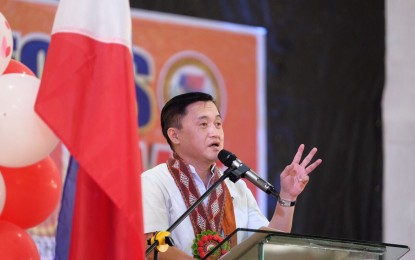
MANILA -- Former Special Assistant to the President Christopher Lawrence “Bong” Go on Tuesday stressed the need to further improve the country’s irrigation system to boost the country’s agricultural sector, citing its crucial importance to the country’s economic progress.
Speaking before teachers at the 2018 Educators Disaster Risk Reduction-Climate Change Adaptation and “Alay Pasasalamat sa mga Guro” at Monkayo, Compostela Valley, Go noted that the agriculture sector is already feeling the pinch.
“Ang supply ng isda apektado tapos ang abono nagmahal na,” Go said.
The Philippine Statistics Authority said agriculture contracted by 0.83 percent in the third quarter of 2018, particularly because of the drop of production in crops and fisheries.
Still, for the first nine months of 2018, agriculture posted a 0.15 percent increase in output.
Go said President Rodrigo Duterte is determined to address the woes of the agricultural sector, particularly in the production of rice and other crops.
“Mismo si Pangulong Rodrigo Duterte po ay alam ang problemang ito kaya naman pinag-ibayo niya ang suporta sa agrikultura, kabilang na ang pagsasabatas ng Free Irrigation Service Act na kabilang sa kanyang mga pangako noong panahon ng kampanya,” Go said.
Under the law, all farmers with landholdings of eight hectares and below are exempted from paying irrigation service fees for water derived from national irrigation systems (NIS) and communal irrigation systems.
The law also condoned unpaid irrigation fees of farmers to the NIA.

Go, who is running for senator in the 2019 elections, said the government must invest more in irrigation as a first and crucial step in boosting the agricultural sector, particularly crop production.
The National Economic Development Authority estimates that improved irrigation in any part of the Philippines can increase crop production by as much as 15 to 20 percent.
“Kung papalarin po tayo sa Senado, sisiguraduhin ko po na hindi lamang may sapat na pondo ang National Irrigation Authority kundi pati na rin ang katiyakan na nagagawa nila ang target sa pagpapalawak ng irigasyon sa ating bansa,” Go said.
He noted that NIA was only able to irrigate a total of 1.887 million hectares as of last year, or 60.35 percent of the 3.128 million hectares of irrigable lands in the Philippines.
“Nakakalungkot, tayo na dating nag-eexport na ng bigas ay palagi na lamang nag-iimport ngayon sa ating mga kalapit bansa na karamihan ay dito pa mismo sa atin sa International Rice Research Institute nag-aral kung paano mapapaganda ang ani,” Go said.
He noted reports that Vietnam, which is one of the countries we import our rice, has fully covered with irrigation of its rice lands totaling 7.5 million hectares. Another source of our imported rice, Thailand, boasts of 80-percent irrigation coverage for its rice farms totaling 11 million hectares.
NIA officials bared during the congressional hearing for the 2019 budget that it is crafting an irrigation master plan seeking to cover 85 percent of the total irrigable areas or about 2.66 million hectares.
However, they admitted that at the current pace of about 40,000 hectares per year they are progressing, it would take them years to provide irrigation to the total 3.128 million hectares of irrigable lands in the country.
“Kaya naman dapat lamang na suportahan at palakasin pa ang kampanya ng administrasyon ni Pangulong Duterte para mabigyan ng irigasyon ang ating mga taniman dahil kung hindi, patuloy lamang tataas ang presyo ng pagkain, patuloy na maghihirap ang ating magsasaka, at mabagal ang pag-unlad ng ating bansa,” Go said.
Apart from improved irrigation, Go is also proposing to provide low-interest loans to farmers, cut costs of farm inputs, provide more expert assistance to farmers, strategic farm-to-market roads, and establishments of more Tienda Malasakit stores where consumers can buy lower-priced agricultural produce.
The Tienda Malasakit store is a project of the Department of Agriculture to help farmers sell their products directly to consumers.
As for fisheries, Go wants to provide additional support to the program of DA that grants fishermen loans to allow them to buy new equipment and facilities, such as bigger boats, ice-making machines or refrigerated vans.
Aside from strengthening agriculture, Go’s legislative agenda covers proposals on improved health services, campaign against illegal drugs and criminality, housing, education, sports and youth development, anti-corruption, localized peace talks, fire protection and prevention, creation of a Department of OFWs, Magna Carta for barangay officials, and better support for senior citizens. (PR)
